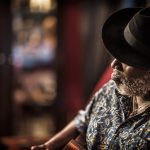UNESCO’s International Jazz Day heralds America’s root-and-branches music worldwide
The first International Jazz Day — April 30 2012 — was a phenomenal world-wide event, initiated by composer-pianist Herbie Hancock and reaching at the very least the 195 nations that had musicians playing Hancock’s “Watermelon Man” in tandem with his own performance of it at a sunrise concert in Congo Square, New Orleans. The sunset concert in the hallowed and vast main hall of the UN was an impressively strong demonstration of jazz’s vitality and diversity, too. Videos of both entire shows as live-streamed (but poorly indexed) are now archived at the website of the Thelonious Monk Institute of Jazz, which co-sponsored the initiative with UNESCO.
Read my short-hand review, please, in CityArts-New York of the sunset concert of International Jazz Day in the General Assembly of the UN in New York City. The music of Louis Armstrong, Duke Ellington, Miles Davis, Thelonious Monk, John Coltrane, Billie Holiday, Howlin’ Wolf , Leonard Bernstein and many more was manifest by all-stars of all ages (Esperanza Spalding, 28, to Candido Camero, 91), many ethnic backgrounds and aesthetic leanings (Chaka Khan, say, to Zakir Hussain). I never in my life thought I’d hear Wolf’s “How Many More Years?” wailed from the podium where so much rhetoric has served so many conflicting interests, yet on this night, Robert Cray and Susan Tedesco, with Derek Trucks squeezing hot licks from his bad ax, delivered just that.
It was amazing and for jazz devotees enormously heartening to watch the Secretary General of the UN Ban Ki-moon on
giant tv screens hung on the front wall of the General Assembly mention that “the UN flag is, after all, kind of blue.” He allowed that he was “in the mood” to “sing sing sing,” offering special thanks to those who “take the A-train” to attend an event celebrating music that takes us from “April in Paris to autumn in New York, from a night in tunisia to Ipanema, and Birdland.”
It was inspiring to hear U.S. permanent representative to the UN Susan Rice say, “The origins and early developments of jazz are quintessentially American . . .Like democracy itself, jazz has structure, but within it you can say almost anything. . . . Now jazz is everyone’s music.” And she quoted Charlie Parker — “If you haven’t lived it, it can’t come out of your horn.” (Can you imagine George W. Bush’s UN ambassador John Bolton saying such things? Can you imagine these words being spoken on the floor of the U.S. Senate or House of Representatives? WHY NOT?)
It was incredible but so beautiful it brought tears to my hard old eyes to hear UNESCO General Director Irina Bokova say that although there is much disagreement and mystery about the origins of the term for our music , “to UNESCO, ‘jazz’ is 
According to one jazz wife who gets her information first-hand, Herbie Hancock, appointed last year as a UNESCO cultural ambassador, had been walking around the rehearsals saying the U.S. has blown its chance to promote jazz as our own major, enduring contribution to humanity’s artistic heritage, but fortunately UNESCO has stepped up to embrace jazz for everyone the world-over. Whatever the reason the U.S. is so reluctant to support its artists and acknowledge other-than-commerical or classical arts, our nation has indeed created something in jazz to be proud of.
As UNESCO’s Ms. Bokova, who is Bulgarian, said in her remarks, “Jazz is the music that makes the most of the humanity’s diversity, that crosses all borders and brings people together. Jazz is not something that you only hear, it is something you feel deep inside that bursts forth in joyous expression. There is hardly a better school of sharing and cultural dialog.”
What a joy for those of us who have harbored that idea privately, perhaps thinking we must be delusional or sorely mistaken, to have the unique communicative powers of jazz certified from the podium of the one organization which, for all its flaws, attempts to 
Jazz being America’s deep music, its strategies as well as its sounds rooted at the core of our cultural dna and stretching out always to the next phase, the place or the phase we haven’t yet been, it seems vital that anybody who digs any style or genre of contemporary music be aware of its celebrity and what high regard it enjoys all over the known universe, if sometimes not enough here at home. Enough reason to give jazz another look and listen.





